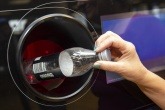Glass should not be included in Scottish DRS, says trade body
British Glass, the trade body for the UK glass industry, has written an open letter to the Scottish Environment Minister, Roseanna Cunningham, raising concerns about the inclusion of glass in Scotland’s deposit return scheme (DRS).

The Scottish Government revealed its plans for the DRS in May, proposing that the scheme will set a 20 pence deposit on all containers above 50 millilitres and up to three litres in size made from aluminium and steel, glass or PET plastic. This is known as an ‘all-in’ system, which is the form preferred by former Environment Secretary Michael Gove for England’s proposed DRS.
British Glass, however, has stated that glass should not be included in Scotland’s DRS, suggesting that the inclusion of glass will be counterproductive to the achievement of Scotland’s environmental ambitions and impact negatively on glass recycling.
The letter, published yesterday (28 August), highlights that glass – which is 100 per cent recyclable – is currently widely recycled in the UK, with 67 per cent of all glass bottles and jars being collected for recycling. The letter suggests that the inclusion of glass in the new DRS will disrupt the success of the current system, as the use of two different recycling systems will lead to consumer confusion.
British Glass also raises concerns about the additional cost of including glass in the DRS, due to its heavy weight and low value. According to the letter, Zero Waste Scotland has calculated that the inclusion of glass will increase the total cost of the DRS by around £25 million per year, whilst recent British Glass research has suggested that the additional costs could be around 2-3 times this figure.
The letter also states that the inclusion of glass in the DRS will cause disruption to the glass industry, as increased costs will reduce demand for glass containers.
British Glass proposes that the Scottish Government should instead focus on improving the current glass recycling system using funding from an extended producer responsibility scheme (EPR). The letter suggests that investment in kerbside collections and bottle bank models would boost recycling figures and reduce the complexity of the DRS, stating: ‘We call on the Scottish Government and MSPs across Parliament to exclude glass from the DRS at this stage and consider an innovative approach which blends kerbside, EPR and bottle bank sites to recover the maximum amount of post-consumer glass.
‘The glass container sector and our partners in the wider drinks supply chain understand and accept the need for action. We will continue to work together with the Scottish Government and Zero Waste Scotland to develop the best possible glass recycling system for Scotland.’
Local authority concerns
The issues discussed in the letter echo some of the concerns that have been raised by local authorities.
The Local Authority Recycling Advisory Committee (LARAC) has previously questioned whether a DRS is necessary when 99 per cent of councils already collect plastic and glass bottles and aluminium and steel cans at the kerbside.
At a recent evidence session as part of Parliament’s Housing, Communities and Local Government Committee’s inquiry into the government’s Resources and Waste Strategy, Dan Roberts, Vice Chair of LARAC, reiterated fears that a DRS would “cannibalise” the current system, depriving councils of revenue from the valuable materials collected at the kerbside. As opposed to an ‘all-in’ DRS, such as the proposed Scottish scheme, LARAC has expressed a preference for an ‘on-the-go’ DRS, which would accept items not captured by household recycling, such as disposable coffee cups.
Despite the unease amongst councils, the UK Government has recently confirmed its plans to follow in Scotland’s lead by introducing a DRS for drinks containers in England and Wales from 2023. Therese Coffey – now Minister of State at the Department for Environment, Food and Rural Affairs (Defra) – dismissed local authorities’ concerns, saying that a DRS would not threaten the sustainability of the kerbside system. Defra has not yet confirmed whether the DRS in England and Wales will be the ‘all-in’ or ‘on-the-go’ model.
You can read the open letter on the British Glass website. 











